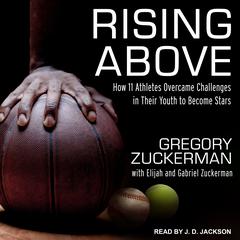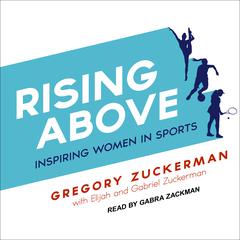 Play Audiobook Sample
Play Audiobook Sample
The Greatest Trade Ever: The Behind-the-Scenes Story of How John Paulson Defied Wall Street and Made Financial History Audiobook
 Play Audiobook Sample
Play Audiobook Sample
Quick Stats About this Audiobook
Total Audiobook Chapters:
Longest Chapter Length:
Shortest Chapter Length:
Average Chapter Length:
Audiobooks by this Author:
Publisher Description
In 2006, hedge fund manager John Paulson realized something few others suspected--that the housing market and the value of subprime mortgages were grossly inflated and headed for a major fall. Paulson's background was in mergers and acquisitions, however, and he knew little about real estate or how to wager against housing. He had spent a career as an also-ran on Wall Street. But Paulson was convinced this was his chance to make his mark. He just wasn't sure how to do it. Colleagues at investment banks scoffed at him and investors dismissed him. Even pros skeptical about housing shied away from the complicated derivative investments that Paulson was just learning about. But Paulson and a handful of renegade investors such as Jeffrey Greene and Michael Burry began to bet heavily against risky mortgages and precarious financial companies. Timing is everything, though. Initially, Paulson and the others lost tens of millions of dollars as real estate and stocks continued to soar. Rather than back down, however, Paulson redoubled his bets, putting his hedge fund and his reputation on the line. In the summer of 2007, the markets began to implode, bringing Paulson early profits, but also sparking efforts to rescue real estate and derail him. By year's end, though, John Paulson had pulled off the greatest trade in financial history, earning more than $15 billion for his firm--a figure that dwarfed George Soros's billion-dollar currency trade in 1992. Paulson made billions more in 2008 by transforming his gutsy move. Some of the underdog investors who attempted the daring trade also reaped fortunes. But others who got the timing wrong met devastating failure, discovering that being early and right wasn't nearly enough. Written by the prizewinning reporter who broke the story in The Wall Street Journal, The Greatest Trade Ever is a superbly written, fast-paced, behind-the-scenes narrative of how a contrarian foresaw an escalating financial crisis--that outwitted Chuck Prince, Stanley O'Neal, Richard Fuld, and Wall Street's titans--to make financial history.
Download and start listening now!
"I really liked it. I've been reading books on the Financial Crisis left and right, but this is the first one (OK, to be fair, I listened to the Audible version). I was really, really into it. It's a great story and you'll learn a lot about derivatives and how this all went down. I'm tempted to say it's as good as that one by the guy who wrote MONEYBALL, but, again, it was the first one I read so that gives it clout."
— Brady (4 out of 5 stars)
The Greatest Trade Ever Listener Reviews
-
" Book describes How Paulson navigated the very tricky bet he placed against the housing market which made him a record amount of money in a short time (4 billion) and made him one of the wealthiest men on Wall Street. Book gives some significant information which helps you to understand Wall Street. "
— Graham, 2/19/2014 -
" The Greatest Trade Ever is an absorbing read; an adroit journalist, Zuckerman finds the drama in the figures and events as they apparently unfolded (a skill shared by documentarians and fiction writers, working at their best), avoids the trap of wealthy white guy porn and manages to explain credit default swaps in a concise way understandable to people who do NOT work in the securities trading industry (including and especially me). As Tina Brown's Daily Beast promised, it's pretty fascinating. What's missing, and this is my political perspective, stay with me, is acknowledgment of the apparent fact that credit default swaps do not provide any benefit to the defaulting debtor (or even, if I've got it right, to the creditor who holds the defaulted instrument, usually a 'bundle' of residential mortgage loan which are saleable as securities, or slice / 'tranche' thereof). Thus it is purely a gambling transaction, adds no value to the economy except it generates immediate periodic fees or premiums for the seller (e.g., Bear Stearns) and a potential payoff to the purchaser (e.g., hedge fund, Jon Paulson in the book), just as though the two parties were betting on the outcome of a cockfight or football match. No land is conveyed, no product is manufactured or sold, no company receives an investment of capital (other than payment of the periodic premiums and payoff mentioned above). Author Zuckerman is a Wall Street Journal writer or columnist by trade, so he's 'Drinking [marinading in:] the Kool-Aid' of the securities traders (WSJ is an editorially conservative paper, 1st, and an essential source of in-depth media coverage of the securities trading markets and fora, to boot). I am not opposed morally to gambling or to speculative trading of securities instruments, I just think it should be mentioned, including in 'The Greatest Trade Ever.' As an English Lit grad I can't but mention that the book could have used an editor -- some clunky and ambiguous passages required a re-reading (or two); I had to machete through some errors of grammar and syntax which I wouldn't have expected from a professional writer. I cannot reject this book, nonetheless, as I mentioned at the top -- if you don't sweat the absurdity of the subprime loan meltdown meaning a few smart hedge fund traders buy new estates in the Hamptons or put generations of their progeny through the most expensive schools in the world, if you work as or with a securities trader[s:], or if you're among the fortunate few who cannot fathom the vagaries of living on annual income of less than $300,000.00, you'll be engaged by this book and its complementary trajectories of (1) financial crisis incoming and (2) desperate hedge fund managers and high-end traders hanging on to and adding to sizable trading positions /CDS obligations which many could understand but a lot fewer bought into. "
— Mickaugrec, 2/11/2014 -
" Really hard to understand if you are not an MIT grad. An interesting insight into creating a reality in the financial world. Great characters! "
— Maureen, 2/10/2014 -
" This book really made me stop and think about the financial industry in more depth. At times breath taking in its idolizing of greed, and the way the US crisis became a global crisis, the author spins a good story of wealthy people who suffer the same fears of the poor. Will recommend this book for a rainy weekend read - gripping and nicely told! "
— Mukhtar, 2/5/2014 -
" OK, I am biased, but this book is really very good! "
— Sarah, 2/3/2014 -
" I love these kinds of books. Even though it's already happened, so you know how it turns out, it's interesting because it's real. John Paulson took some big risks and made enormous sums of money by sticking to his ... not values, but belief in himself and his analysis of the overheated housing market. "
— Tim, 1/29/2014 -
" Banal recounting of an impressive feat. "
— Tom, 1/20/2014 -
" Admiring book before Paulson's later long, slow fall from grace. "
— Paul, 1/20/2014 -
" Well-written, noteworthy, and, as with most books on the financial crisis, depressing and endlessly frustrating. "
— Brian, 1/3/2014 -
" This book was great -- a finance suspense. I couldn't put it down. (This has got to sound crazy about a finance book.) "
— Mark, 12/7/2013 -
" Fascinating story of why investing is a beautiful art, sadly this story dealt with a massive crash in the American economy that resulted in the Greatest Trade Ever. I highly suggest it to anyone interested in investing. "
— Mwambolt, 12/4/2013 -
" The book demonstrates that conventional wisdom is not to be followed. Gives good color to the mortgage crisis and the few players who recognized what the so-called experts could not and profited handsomely. "
— Sue, 12/3/2013 -
" Another clear exposition of the financial criss "
— Mike, 10/18/2013 -
" Despite the awful title, the book is a really informative book about the financial crisis of 2008. An interesting and more detailed complement to Lewis' The Big Short. "
— Sean, 10/15/2012 -
" This is a very accessible description of the subprime trade and how it played out for a few different investors with a focus on Paulson. It also provides some interesting notes on the housing bubble and how it developed to create the opportunity for Paulson et al. An excellent credit crisis book. "
— Jonathan, 9/23/2012 -
" Slightly better than Lewis' The Big Short... both very well researched and understood though "
— Derrick, 6/18/2012 -
" Big disappointment. Couldn't stop wondering - did John Paulson pay for this or is Zuckerman such a poor writer. "
— Savremennik, 11/3/2011 -
" Nothing great about Paulson and the rest of these guys. "
— Jan, 11/1/2011 -
" Who has ever heard of John Paulson ? Read it to know him. It was very informative and interesting. "
— Rohit, 8/29/2011 -
" Not very technical terms of the financial detail but a very enjoyable and good read about the behind the scenes story of the lives of the people involved in shorting the housing market. "
— Ed, 7/21/2011 -
" read a little like a tabloid "
— Talal, 5/23/2011 -
" Read it right before Lewis' Bi Short about the same subject. Both were great, I think I prefer Zuckerman's account. "
— Andrew, 5/2/2011 -
" Another clear exposition of the financial criss "
— Mike, 1/15/2011 -
" Despite the awful title, the book is a really informative book about the financial crisis of 2008. An interesting and more detailed complement to Lewis' The Big Short. "
— Sean, 11/25/2010 -
" this is a book too far about the financial system . i am sure that John Paulson is pleased to have made $20 bill but it all seems so last century now and the details goes on for ever . well researched i am sure "
— Alistair, 10/1/2010 -
" A great book about one of the key drivers of the 2008 capital markets crash. Really describes the "behind the scenes" events that are influencing our economic turmoil today. Really like how Zuckerman told the story in an almost like fiction fashion. Definitely worth the time to read. "
— Ric, 8/30/2010 -
" Follows the subprime mortage crisis and one guy who was able to say, "I told you so," when it all collapsed. Zuckerman includes lots of little biographical notes about the Wall Street players to keep it interesting; Reads like a Dan Brown book compared to other books on the subject. "
— Hugger, 7/16/2010
About Gregory Zuckerman
Gregory Zuckerman is the author of The Greatest Trade Ever and The Frackers, among other books, and is a special writer at the Wall Street Journal. He writes about big financial trades, hedge funds, private-equity firms, and other investing and business topics. He is a three-time winner of the Gerald Loeb Award, the highest honor in business journalism. He appears regularly on CNBC, Fox Business, and other networks,and he makes appearances on radio stations around the globe.
About Marc Cashman
Marc Cashman, Earphones Award–winning narrator, was named one of the “Best Voices of the Year” by AudioFile magazine. His voice can be heard on radio, television, film, and video games. He also instructs voice actors through his classes, The Cashman Cache of Voice-Acting Techniques, in Los Angeles.
























